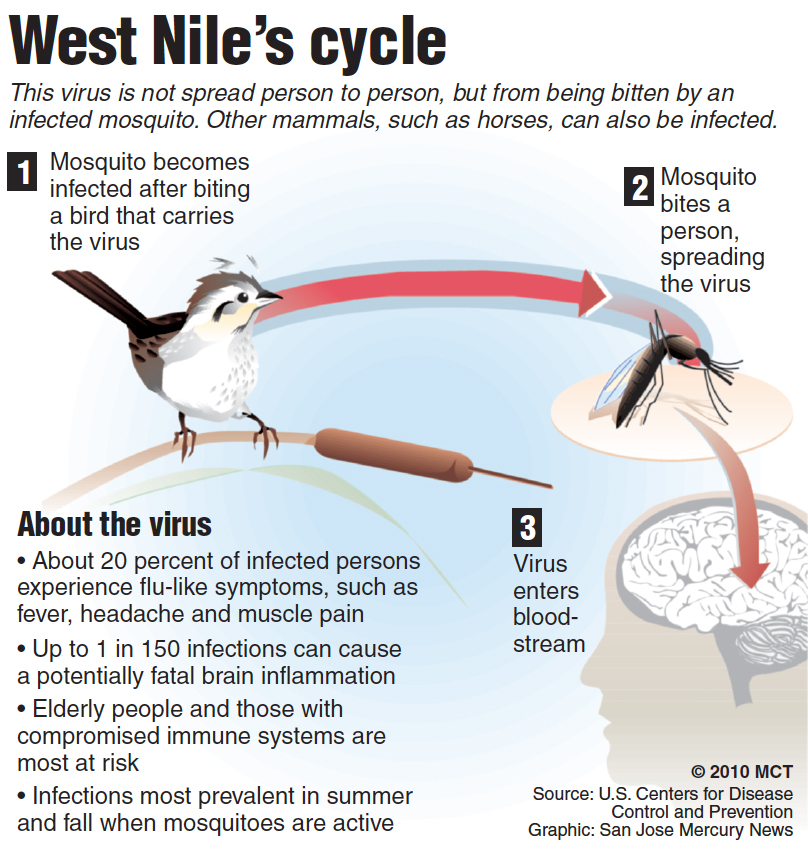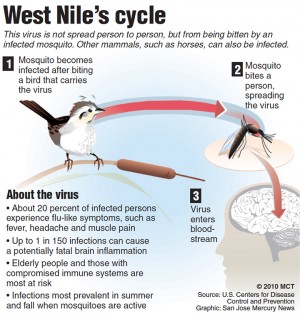Who thought something as small as a mosquito could cause such a big problem?
A recent outbreak of the West Nile virus has occurred in the Waco-McLennan area, resulting in 32 confirmed cases and one confirmed death, according to the Waco-McLennan County Public Health District’s website.
West Nile virus is an established seasonal epidemic, with cases beginning to appear in the summer and lasting into the fall, according to the Centers for Disease Control. Mosquitos become carriers of the disease after feeding on infected birds. The disease then spreads to humans and other animals from the mosquito’s bite.
Those infected with West Nile virus usually develop symptoms between three to 14 days after being bitten. Symptoms vary among those infected from severe to asymptomatic.
Severe symptoms can last several weeks and permanently affect a person’s nervous system, while moderate symptoms last from a few days to several weeks at the most.
Richard Duhrkoph, associate professor of biology and chair of the Institutional Animal Care and Use Commitee, has studied mosquito genetics and has been involved in gathering information about the virus.
Duhrkoph said mosquito populations have gotten large in the past year due to wet and mild conditions during the past winter.
“The mosquitos that would’ve died because of freezing didn’t and as such, we started the spring with larger populations of mosquitos than we normally would and we’ve kept that going because we’ve actually had a relatively wet summer,” Duhrkoph said.
He said mosquitos transfer the infection to humans from the infected birds.
“Initially when this virus hit the United States, it killed lots and lots of birds. This is not a human virus, it’s a bird virus,” Duhrkoph said. Yet, he added, the birds don’t seem to be dying anymore and may have evolved an immunity to the virus.
Currently, there is no way to treat West Nile virus, which is why preventative measures should be taken to decrease the possbility of being bitten.
“Mosquitos are most active around dawn and dusk, so it is best to avoid being outside during those times,” Sharon Stern, the medical director of Baylor Health Services, wrote in an email to the Lariat. “It is prudent to get rid of any standing water and clean bird baths or pets’ water bowls daily.”
Stern also recommended using insecticide with 35 percent DEET and wearing long-sleeved shirts and long pants to avoid exposure.
“If anyone is concerned they have symptoms of West Nile virus, they should come to the Health Center or see their own private physician,” Stern said. “There is a blood test for it which a doctor can order if indicated.”
Even though the recent outbreak of West Nile may be attributed to seasonal changes, Duhrkoph said it is still a serious concern.
“It’s a concern because people are getting infected,” he said. “People are getting sick and I just read some stuff this morning that normally, our perspective on this disease is that it’s a relatively insignificant disease in that the vast majority of people that get infected don’t have any problems.”
Duhrkoph said the disease is a major concern because of the potential for recurrence.
“People can get infected now and can survive. They may not even have very much of a symptom, but in 10 years, they may start having severe headaches, they may start having problems with coordination, they may have speech problems, they may have memory problems. So it’s a very serious thing, it’s there, we have to understand that this is something we can’t get rid of. It’s something that exists out there, it’s something that exists in the world.”
For more information about West Nile Virus, contact the Waco-McLennan County Public District at 254-750-5450.







